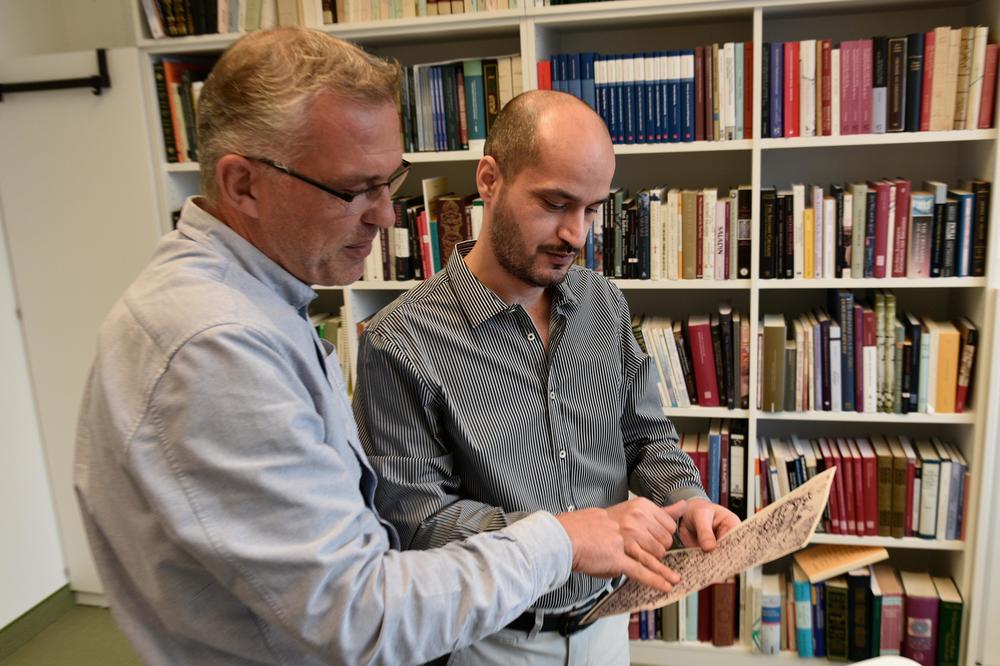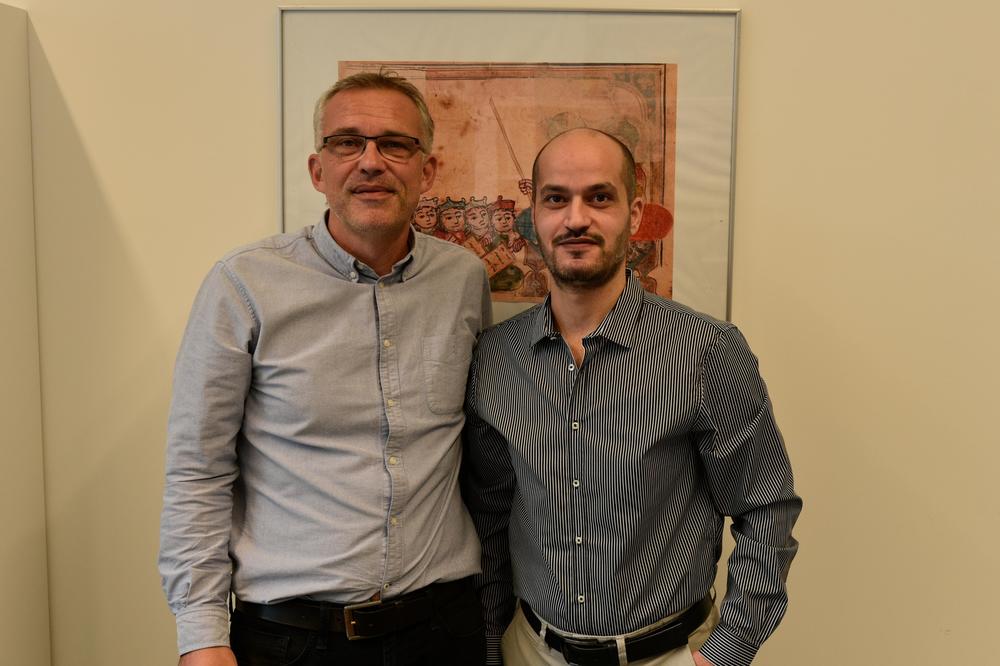“Nothing Stays the Same”
Library specialist Said Aljoumani had to flee Damascus. He and Islamic studies scholar Konrad Hirschler are currently doing research at Freie Universität on the bibliophile history of Syria.
Aug 20, 2020
Said Aljoumani (at right) and Konrad Hirschler (at left) are among the few scholars in the world who do research on the use of libraries in medieval Syria.
Image Credit: Jonas Huggins
Konrad Hirschler works in a highly specialized field. The professor of Islamic studies at Freie Universität Berlin is investigating the use of libraries in Syria in the Middle Ages. Which social groups owned books in those days? What kinds of reading circles were there? How were women involved in cultural life?
“There are not many people in the world who work in this social and cultural historical field,” says Hirschler. Having enough expertise to be able to decipher the often difficult-to-read notes documenting the use of the books, their donation to a library, or their private ownership is even more seldom.
Looking for an Expert
Said Aljoumani has this expertise. In 2012 Konrad Hirschler came across his name in an Arabic-language publication. Yet, despite many efforts to establish contact with his Syrian colleague, he was not able to do so. Four years later Hirschler came across the name again, this time on the list of participants at a conference in Cambridge. There, too, he was unable to find the scholar in person.
“Said Aljoumani remained a myth,” Konrad Hirschler recalls. Until one day in the spring of 2017, the phone rang in Dahlem, and Said Aljoumani was on the line. He asked Hirschler, if he could work with him. He arrived in Berlin a few months later.
In 2016 Aljoumani fled Syria and went to Jordan, where he received a fellowship through the Scholar Rescue Fund. The Fund provides transitional funding for scholars and scientists who have to flee their homeland.
When the civil war broke out in Syria in 2011, Said Aljoumani had just completed his doctorate in library science. He was drafted into the army and was refused permission to attend the conference in Cambridge. Visits home were rare. His daughter was a month old, when he saw her for the first time. The next time he went home for a visit, she could walk. He was in the war for four and a half years, a time he would prefer to forget.
From Syria via Lebanon and Jordan to Germany
In August 2016, Aljoumani managed to escape from Syria by evading government checkpoints. To cross the border to Lebanon, he had to walk through the mountains. In Lebanon he received a fellowship from the Scholar Rescue Fund that took him to the University of Jordan in Amman for a year. However, his main subject, library studies, was not available there, so he got in touch with Konrad Hirschler. Aljoumani knew that Hirschler had quoted one of his publications. Finally, he came to Freie Universität.
In the summer of 2018, after another year of struggling with the visa bureaucracy, his wife and two children were able to join him. Being reunited in Berlin – “that was paradise,” said Aljoumani.
The family has settled in well. The children, now eight and ten years old, have made friends at school. Parents of their new friends borrowed a car and helped the Aljoumani family move, when they found a new place to live in Berlin.
Working Together on a Book
Said Aljoumani, who in the meantime had a fellowship from the Philipp Schwartz Initiative of the Alexander von Humboldt Foundation and is now working as an Einstein Guest Researcher through funds from the Einstein Foundation Berlin, is happy to be able to devote himself to his research again.
Forged a friendship by working together: Historians Said Aljoumani (at right) and Konrad Hirschler (at left) have been working together at the Institute of Islamic Studies at Freie Universität since 2017.
Image Credit: Jonas Huggins
Aljoumani says the Institute of Islamic Studies is like a family for him and Konrad Hirschler has become a close friend.
The two historians are currently working together on a book about a scholar from 15th century Damascus. In addition, they are trying to re-establish contact with Syrian scholars.
Said Aljoumani is also working on indexing tens of thousands of medieval library documents that recorded when, where, and by whom books were read together.
It takes a lot of experience with Arabic manuscripts to decipher the notations that readers wrote in the books in the Middle Ages. According to Hirschler, only a few scholars have touched this material, which is fascinating for the everyday history of books, “as it is fundamental research and the findings are initially difficult to get published.”
Mentally in Damascus Every Day
“The collaboration with Said Aljoumani is one of the most fruitful that I have ever had with another scholar,” says Professor Hirschler. That is partly because the two have had very different training. Arabic-language publications on medieval history often focus on the presentation of new material, while in English-language publications, the focus tends to be on argumentative discussions. “If you bring the two research traditions together, everybody can benefit,” says Said Aljoumani.
Of course, he misses Damascus. While working on his doctorate in Cairo – before the civil war started in Syria – he started studying the history of his hometown very intensively and got to know and love the city in a completely new way. His work in Berlin mentally takes him back to Damascus every day.
An actual visit does not come into question. Even when his mother was dying, it was impossible to return. “That is very, very difficult,” says Said Aljoumani. The near future will also be tough for Syria. Aljoumani is cautiously optimistic about the long run. “Damascus has seen many wars and disasters and has always recovered,” he says. “As a historian, you know that nothing stays the same.”
The original German version of this interview was published on August 13, 2020, in campus.leben, the online magazine of Freie Universität Berlin.


